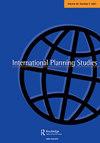对“智慧城市”作为非洲城市发展战略的批判性分析
IF 1.5
Q4 REGIONAL & URBAN PLANNING
引用次数: 4
摘要
智慧城市正在成为一种流行的城市发展战略,以解决包括非洲在内的全球城市面临的复杂和多重挑战。本文使用3RC框架,利用内罗毕(肯尼亚)、约翰内斯堡(南非)、拉各斯(尼日利亚)、基加利(卢旺达)和卡萨布兰卡(摩洛哥)的经验,批判性地分析了智慧城市。智慧城市是非洲实现可持续城市化的灵丹妙药吗?我们的分析表明,如果精心规划和实施,智慧城市干预措施有可能改变非洲城市的规划、管理和治理方式。与此同时,在非洲实施智慧城市干预措施的背景是社会经济不平等、交通系统混乱、大规模治理失败等挑战。研究表明,如果应用不当,智慧城市技术可能会通过城市空间的私有化和市场化加深现有的不平等,放大空间排斥。因此,在非洲采用智慧城市理念必须植根于背景现实,并进行适当调整,以创造可持续和包容的城市空间。本文章由计算机程序翻译,如有差异,请以英文原文为准。
A critical analysis of ‘smart cities’ as an urban development strategy in Africa
ABSTRACT Smart cities are becoming a popular urban development strategy to address complex and multiple challenges confronting cities globally, including in Africa. Using the 3RC framework, this paper critically analyses smart cities using experiences from Nairobi (Kenya), Johannesburg (South Africa), Lagos (Nigeria), Kigali (Rwanda) and Casablanca (Morocco). Are smart cities a panacea to Africa's quest for sustainable urbanization? Our analyses demonstrate that, if carefully planned and implemented, smart city interventions have the potential to transform the ways African cities are planned, managed, and governed. At the same time, smart city interventions in Africa are being implemented in contexts characterized by socio-economic inequalities, chaotic transport systems and massive governance failures among other challenges. We demonstrate that if ineffectively deployed, smart urban technologies might deepen existing inequalities and amplify spatial exclusion through privatization and marketization of urban space. Therefore, the adoption of smart city ideas in Africa must be rooted in contextual realities and properly calibrated to create urban spaces that are sustainable and inclusive.
求助全文
通过发布文献求助,成功后即可免费获取论文全文。
去求助
来源期刊

International Planning Studies
REGIONAL & URBAN PLANNING-
CiteScore
4.60
自引率
4.80%
发文量
20
期刊介绍:
Planning, at urban, regional, national and international levels, faces new challenges, notably those related to the growth of globalisation as both an objective socio-economic process and a shift in policy-maker perceptions and modes of analysis. International Planning Studies (IPS) addresses these issues by publishing quality research in a variety of specific fields and from a range of theoretical and normative perspectives, which helps improve understanding of the actual and potential role of planning and planners in this context.
 求助内容:
求助内容: 应助结果提醒方式:
应助结果提醒方式:


